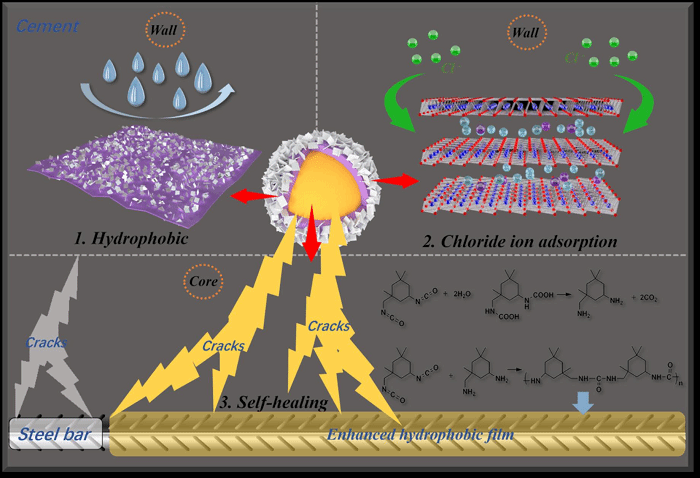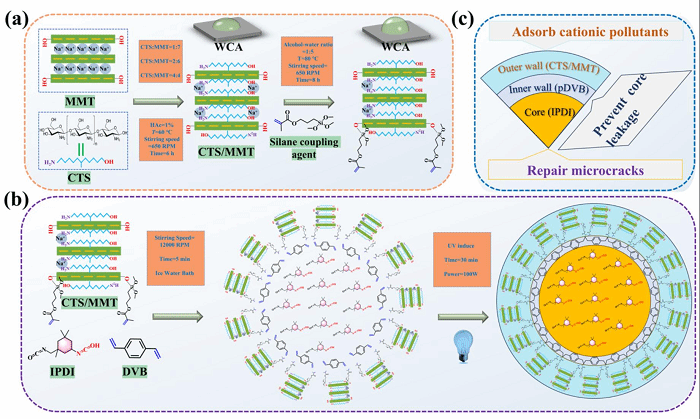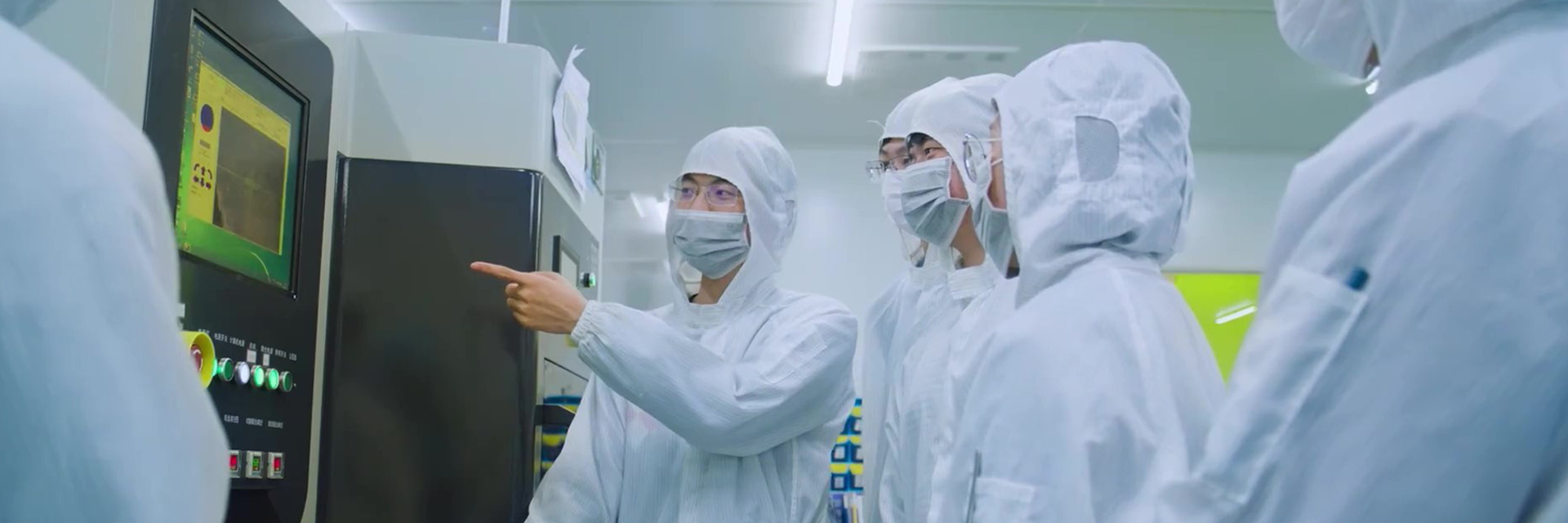It was reported that (by the School of Infrastructure Engineering) recently, the research group led by Professor Wang Xingang from the School of Infrastructure Engineering of NCU has made important advances in the green and efficient preparation of microcapsules and their multifunctionalization. In 2025, they published two research papers in internationally renowned journals, Cement and Concrete Composites and Chemical Engineering Journal, entitled “LDH-based functionalized microcapsules: Multi-step active corrosion resistance strategy toward durable cementitious composites” and “One stone two birds: Chitosan intercalated montmorillonite microcapsules with cationic pollutant adsorption and self-healing for synergistic corrosion resistance” respectively.
At the end of June 2025, Professor Xingang Wang’s team from NCU published their latest research findings in Cement and Concrete Composites, successfully developing LDH-based functionalized microcapsules (LFMCs). Using Pickering emulsion photopolymerization, the microcapsules combine the chloride ion adsorption capability of LDH with the self-healing function of microcapsules, forming a triple-protection system of “adsorption–permeation resistance–repair”. The study showed that the maximum chloride ion adsorption capacity of the microcapsules reached 22.791 mg/g, and the compressive strength recovery rate of the cement matrix increased by 15.17%, significantly enhancing the corrosion resistance of steel reinforcement. This breakthrough provides a new way to improve the durability of concrete structures in harsh environments such as marine engineering. The first author of the paper is Zhong Yiwei, a Ph.D. candidate at NCU, while Professor Wang Xingang is the sole corresponding author and NCU is the sole corresponding institution.

Link to the original article: https://doi.org/10.1016/j.cemconcomp.2025.106203
In addition, Professor Wang’s team published another study in Chemical Engineering Journal, focusing on corrosion protection of metals in cationic pollutant environments. Using chitosan-intercalated montmorillonite as the wall material, they prepared functionally coupled microcapsules via Pickering emulsion photopolymerization. The study found that chitosan intercalation enhanced the adsorption performance of montmorillonite for methylene blue and copper ions, notably reducing the adsorption equilibrium time from 40 minutes to 10–20 minutes. When these microcapsules were incorporated into epoxy coatings, the coatings demonstrated outstanding corrosion protection. After 10 days of immersion in a 3.5 wt% NaCl solution, the coatings showed no signs of corrosion, with a corrosion inhibition efficiency as high as 99.86%. The first author of this paper is Guo Guanjun, a Ph.D. candidate at NCU, while Professor Wang Xingang is the sole corresponding author and NCU is the sole corresponding institution.

Link to the original article: https://doi.org/10.1016/j.cej.2025.164641
Professor Wang Xingang, Ph.D. Supervisor, is a Ganjiang Distinguished Professor and a Deputy Director. He has been recognized as a high-level provincial talent in Jiangxi Province, an outstanding young talent in Jiangxi, an excellent master’s thesis advisor in Jiangxi, and one of the top ten outstanding research supervisors at NCU. Professor Wang’s team focuses on research in green and advanced civil engineering materials, particularly in the areas of green and low-carbon transformation, intelligent functionalization, and ultra-high performance of civil engineering materials. Their research achievements in solid waste recycling and valorization, low-carbon/carbon-capturing building materials, and functional/smart cement-based materials have been successfully transferred to industry and applied in engineering projects, generating significant economic and social benefits. The team includes key members such as Zou Fubing, Tian Weichen, and Cao Wenxiang, along with more than 20 doctoral and postgraduate students.
Zou Fubing, Lecturer and Master Supervisor at the School of Infrastructure Engineering, NCU, is mainly engaged in research on the resource utilization and valorization of solid waste, low-carbon/carbon-capture building materials, and novel inorganic functional materials.
Tian Weichen, Distinguished Research Fellow and Master Supervisor at the School of Infrastructure Engineering of NCU, primarily focuses on research in the integrated design of advanced civil engineering materials and structures, and the application of artificial intelligence in cement-based materials.
Cao Wenxiang, Distinguished Research Fellow and Master Supervisor at the School of Infrastructure of NCU, is mainly involved in research on the high-value utilization of industrial by-product gypsum, solid waste-based environmental functional materials, and low-carbon, lightweight, high-strength materials.




